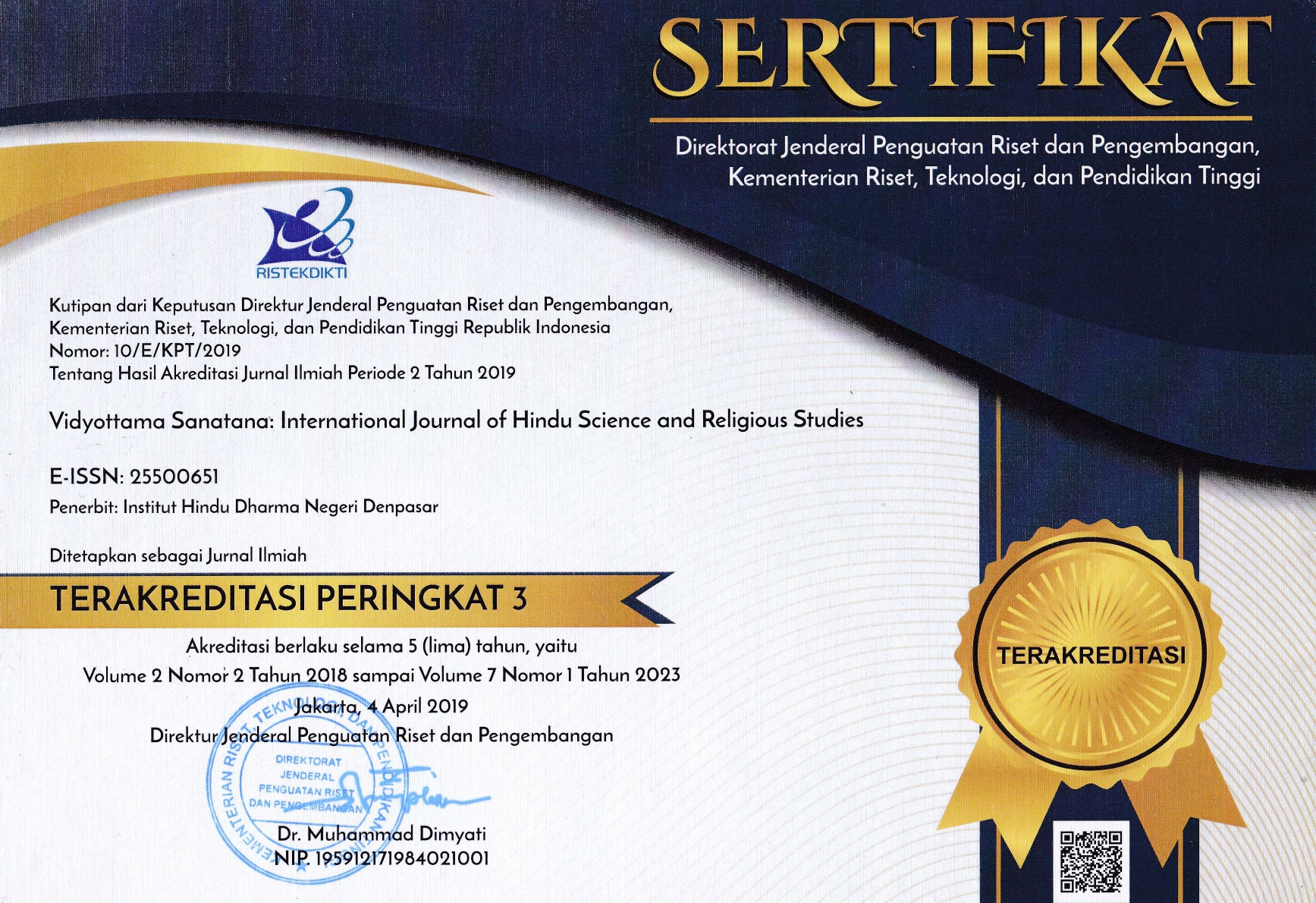RELIGIOUS INTERCONNECTIVITY IN AN EFFORT TO REALIZE GLOBAL PEACE: A PHILOSOPHICAL REVIEW
DOI:
https://doi.org/10.25078/vidyottama.v8i1.3408Keywords:
Religious Interconnectivity, Religious Dialogue, Global Peace, Philosophy of ReligionAbstract
Religion on the one hand is a way to find true happiness on the basis of love, peace, guarantor of safety, moral guidance for all mankind. However, it is not uncommon that in the name of religion it also causes human suffering, triggers conflicts, wars, and various other sufferings that are born from human beings in the name of religion. Therefore, this is certainly counter-productive to the principles of religion which contain noble teachings by prioritizing humanity, peace, love and so on. Therefore, inter-religious dialog must be prioritized, in order to create harmony and peace among human beings. This research seeks to find the common ground of religions through qualitative methods and phenomenological approaches. The results of this study show that an inclusive attitude in religion can be realized through the Trilogy of Harmony, namely 1) Interfaith Harmony, 2) Internal Harmony of Religious Believers, and 3) Harmony between Government and Religious People. Furthermore, religion as a social construction process must be able to act as a moral guide for every human being. In principle, religion is expected to be able to guide global ethics, because there is no world peace without interfaith peace, and there is no interfaith peace without interfaith dialog. Also, interfaith dialog starts from 1) parliamentary dialog, 2) institutional dialog, 3) theological dialog, 4) dialog in community life, and 5) spiritual dialog.
References
Bagir, Z. A., Maarif, S., Munjid, A., Vanderbilt, G., Ahnaf, M. I., & Laksana, A. B. (2016). Studi Agama di Indonesia : Refleksi Pengalaman (Issue July).
Banawiratma, J. B. (2010). Dialog Antar Agama. Bandung: Mizan.
Depag, R. I. (1997). Bingkai Teologi Kerukunan Hidup Umat Beragama Di Indonesia. Jakarta: Badan Penelitian dan Pengembangan Agama Proyek Peningkatan Kerukunan Umat Beragama di Indonesia.
Ghazali, A. M. (2014). Konstruksi Studi Agama-Agama Perspektif Ilmu Perbandingan Agama. 0–65.
Harahap, S. (2011). Teologi Kerukunan. Jakarta: Prenada.
Kung, H. (1991). Global Responsibility: In Search of a New World Ethics. New York: Crossroad.
Muhammad, A. (2013). Agama dan Konflik Sosial. Bandung: Marja.Roth, J. K. (2018). Persoalan-Persoalan Filsafat Agama: Kajian Pemikiran Sembilan Tokoh dalam Sejarah Filsafat dan Teologi. Diterjemahkan oleh Ali Noer Zaman. Pustaka Pelajar.
Sabri, M. (1997). Filsafat Perennial: Perspektif Alternatif bagi Studi Agama dan Signifikansinya terhadap Kehidupan Beragama di Indonesia. Yogyakarta: UIN Sunan Kalidjaga.
Scharf, B. R. (1995). Kajian Sosiologi Agama. Yogyakarta: PT. Tiara Wacana.
Schuon, F. (2003). Mencari Titik Temu Agama-Agama. Jakarta: Pustaka Firdaus.
Sofyan, M. (1999). Agama dan Kekerasan dalam Bingkai Reformasi. Yogyakarta: Media Pressindo.
Zaman, A. N. (2000). Agama untuk Manusia. Yogyakarta: Pustaka Pelajar.


















